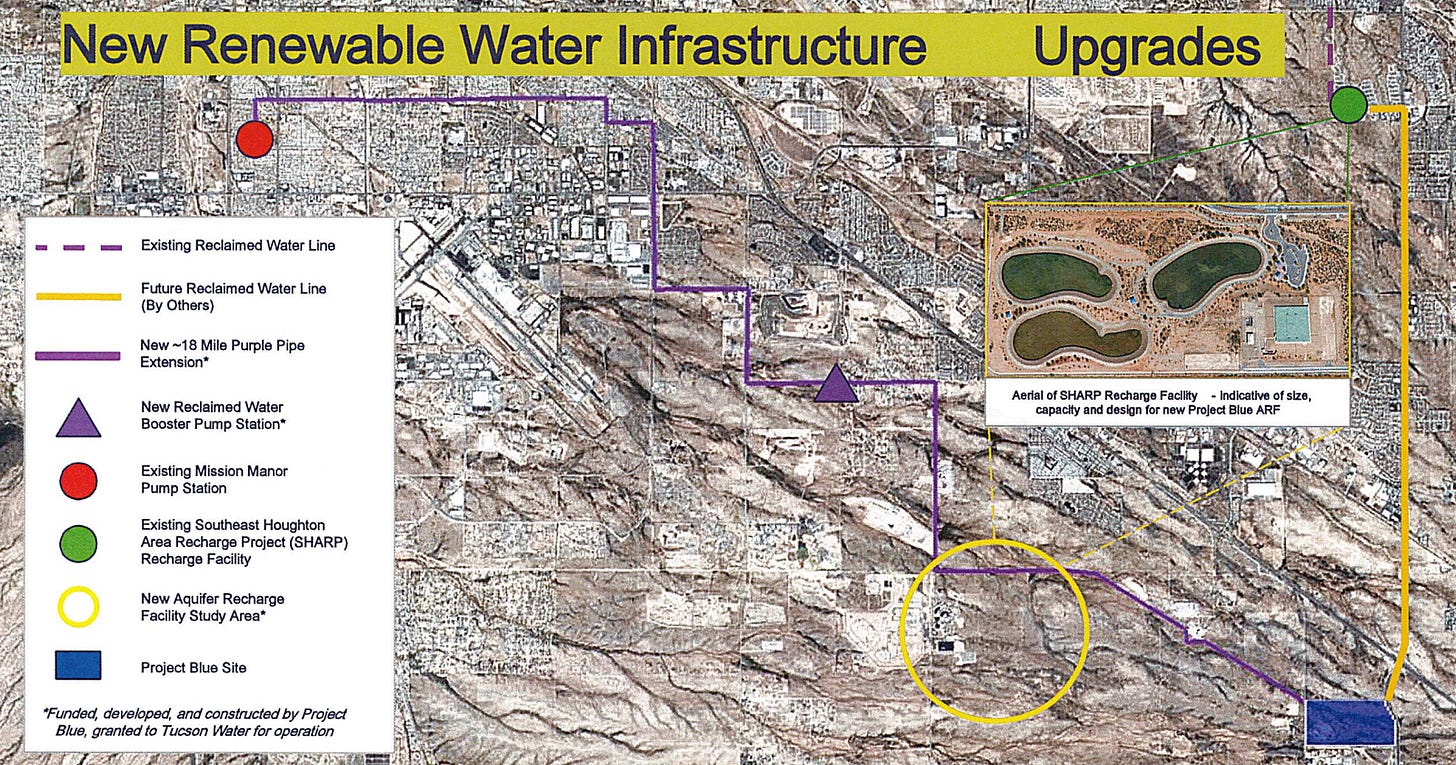Lessons from Project Blue
Allen pushes for changes … Hernandez grabs a camera … And Ciscomani sends another letter.
Pima County Supervisor Jennifer Allen did her homework before voting against “Project Blue,” the still-shrouded-in-mystery data centers that would be built next to the Pima County Fairgrounds.
Unfortunately for her, facts, figures, and opposition from a vocal group of residents weren’t enough to sway a majority of Allen’s colleagues, who voted last week to sell and rezone 290 acres to a proxy for the still-unnamed business behind the data centers.
We sat down with Allen this week to talk about why she opposed the proposal and what went wrong with the Project Blue public process, including what she sees as an over-reliance on non-disclosure agreements (NDAs).
Project Blue NDAs tied the hands of politicians and bureaucrats from saying much about the proposal. It also gave an out-of-state developer an out from sharing important information about the development — like how much water and energy it would use — by stating the information was proprietary. Essentially, that information was treated as tantamount to trade secrets.
“It is completely problematic. And in fact the scope of Project Blue is still so murky and even from the little piece that we decided, it's still unclear,” Allen said. “So there's the plot of land that we sold. The two to four data centers are on half of it. But then it's up to 10 data centers.”
Though supervisors approved it in a 3-2 vote, there was some hope they’d change their minds — especially since Supervisor Matt Heinz requested to reconsider his vote on the data centers shortly after the initial vote.
Heinz was upset that Tucson Electric Power had announced it wanted a 14% rate hike — right after the supervisors had voted on Project Blue.
TEP officials swear the announcement after the Project Blue was purely coincidental, and the rate increase is not tied to planned data centers.
Heinz’s request, as far as we know, is still in limbo due to a legal opinion that board policies preclude reconsideration of votes related to a contract.
If his reconsideration doesn’t happen, the data centers are likely heading to the Tucson City Council next month.
The Council will have to annex the former county parcel — now owned by a third party — in order to guarantee reclaimed water for the data centers.1
Transparency for some
While Allen knows more than most people in Tucson about the proposal, she says too many aspects of Project Blue were kept from her — even as out-of-state developers asked her to sell them county land to build a project that will easily be one of the region’s largest water and energy users.

She wants to move quickly to push for changes inside the county, including how it handles non-disclosure agreements, which tied her hands from speaking freely about the development and allowed the developer to stay quiet on key details to protect the project.
“I think we are going to look at how we can do two things very quickly: (examining) how and when NDAs are utilized, and also integrating in an environmental impact review. Not just economic analysis of projects, but an environmental analysis of projects,” Allen said.
Suspicious numbers
The supervisors were given some information about the economic benefits of the program — which Allen said she was skeptical about — but she argued the county should have had a broader view of the pros and cons of the proposed development.
“I wish that I had probed and pushed more around all of the economic benefit numbers that were put on the table. In hindsight, looking at it, my question's been: Where do these numbers come from? Who generated these numbers? And show me the math behind it because I think we get sold with these large price tags of revenue.”
Short on specifics from the developer, Allen said she has concerns about the project’s potential impact on air quality — which was barely discussed during the four-hour-long board meeting.
While TEP has said it has the capacity to meet the massive energy demands of up to 10 data centers, we’ve heard that the Canadian-owned electric utility has not reached out to the county for new permits to build a new substation to generate additional power.
Allen is concerned that TEP will quietly distance itself from its promises to shut down its Springerville Generating Station, which relies on burning coal, by 2032 — or its commitment to be carbon neutral by 2050 by embracing green energy generation.
“It's really concerning where they will get this electricity and they've not made a commitment that they will honor their commitments to be shutting down the coal-fired power plants,” Allen said.
Advice for the Council
Her advice to the Tucson City Council? Get it in writing and make everything public.
“Well, it's not to trust people who serve to profit from the decision and not to allow those folks to be the ones that are telling us and making all the promises without having all the research, without having everything put in writing,” Allen said.
We’ll know by the end of the week whether Project Blue is back on the Board of Supervisors’ meeting agenda for next week.
Democratic Congressional candidate Daniel Hernandez snatched a voter’s phone out of their hand and threw it to the ground after he and his sisters got into a shouting match with a Bisbee resident about Palestine last week.
Tucson resident Scott Blades posted an eight-second clip online of the incident, in which Alma and Consuelo Hernandez — both members of the Arizona Legislature — were arguing with an older woman who had asked the question about Palestine.
The clip ends with the congressional candidate grabbing the phone from Blades, who said he was simply a bystander filming the interaction.
He said he understood that the Hernandez family was stressed out after a bullet recently hit a car outside their campaign office. But grabbing someone’s phone and throwing it to the ground, is not the right temperament for a congressman.
“If you want to represent us in the U.S. Congress, you have to understand that the public has a right to record your actions in public and the people that you bring with you to political events,” he wrote.
Hernandez said in a prepared statement that he regrets how the incident unfolded, but he and his family were under a tremendous amount of stress just days after a shooting outside of his family’s home.
“This was an unfortunate incident that occurred during an emotionally charged moment for me and my family. Just two days after someone shot through a campaign staffer’s car outside our family home — and only hours after the horrifying murders of lawmakers in Minnesota — a community member initiated an altercation with my sister outside of a political event,” he said. “I regret how the moment unfolded, my only goal in this moment was to protect my family in a difficult moment, and to ensure everyone’s safety.”
Keeping the lights on: State lawmakers still haven’t agreed on a budget for the coming fiscal year. But yesterday did see some movement, even if it’s just a budget proposal from House Republicans that’s doomed to get vetoed, our sister newsletter, the Arizona Agenda, reported. The state government will shut down on Tuesday if lawmakers don’t pass a budget the governor will sign.
Sabino Canyon not for sale?: The Senate parliamentarian said a plan to sell off federal lands, which could include Sabino Canyon and parts of Mount Lemmon, wasn’t directly related to the budget, so it couldn’t be part of the budget reconciliation package, outdoorsy Substacker Wes Siler reports.
Heading to prison: A year after officials uncovered a $38 million embezzlement scheme that bilked local schools and fire districts, a judge sentenced former Santa Cruz County Treasurer Elizabeth Gutfahr to 10 years in federal prison, the Nogales International’s Daisy Zavala Magaña reports. At the sentencing hearing, federal prosecutors accused Gutfahr of “gluttony” after she made 187 fraudulent transactions over the course of a decade.
“I feel so embarrassed and ashamed, and I ask everyone for forgiveness,” Gutfahr said. “There’s no excuse for what I’ve done. I’m working to become a better person.”
Telling their stories: You’ve seen the photos and videos of immigrants being manhandled by federal agents. Substacker Kate Morrissey, who also happens to be a veteran border reporter in San Diego, followed up with some of the immigrants who tried to follow the rules by going to their immigration court hearings, but ended up in handcuffs.
“It's uncomfortable because they transport you as though you were Hannibal Lecter,” Luis said, noting that he was shackled at the wrists, waist and ankles. “One feels like an assassin. What did I do?”
Starry night, courtesy of the UA: The first images from the largest digital camera ever made were released to the public on Monday, the Associated Press reports. The Vera C. Rubin Observatory in Chile, which uses mirrors that were manufactured on the University of Arizona campus, is gathering images of nebulas that are thousands of light-years from Earth while it searches for dark matter and dark energy. Meanwhile, federal budget cuts are jeopardizing seven UA space projects, including the OSIRIS-APEX project that was meant to study large asteroids, the Tucson Sentinel’s Adrian O’Farrill reports.
Take advantage of being the only intelligent life forms (that we know of) in an infinite cosmos by clicking that button and getting even smarter!
Streamlining the process: The Pima County Recorder’s Office is trying to simplify the mail-in voting process, and avoid time-consuming errors, KGUN reports. Under the new system, voters will get a single envelope (instead of the two envelopes they used to get), which officials hope will ensure voters fill out affidavits and allow for faster signature verification and counting. Ballots are already in mailboxes for the July 15 special primary election for Congressional District 7.
Tucson Congressman Juan Ciscomani joined 15 of his colleagues in the House in writing a letter this week asking his Senate counterparts to protect Medicaid and funding for rural hospitals in their budget bill.
The letter’s message? Don’t cut Medicaid more than we already did in the House.
“We write to reiterate that commitment to those we represent here in Washington,” the 16-member group of House Republicans wrote. “The proposal released by the Senate Finance Committee on June 16 includes provisions that go beyond H.R. 1. The House’s approach reflects a more pragmatic and compassionate standard, and we urge that it be retained in the final bill.”
Apparently, $793 billion in Medicaid spending cuts contained in the House’s version of the “Big, Beautiful Bill” over 10 years is the perfect number.
But $794 billion? Well, that’s just irresponsible.
A pre-annexation development agreement between the city and the developer would include the latter paying for an 18-mile pipeline to bring in treated wastewater to the data centers.










Yikes… the syntax alone in that Ciscomani letter was messy, and the messaging is murky at best. He and the rest of those 15 are clearly having a hard time messaging, whether it’s “no cuts to Medicaid” or “waste, fraud, and abuse” or “we stand with the president” and any other party line.
I'm glad to hear some bits about Project Blue, even of it is still shrouded in mystery. I'm also pretty skeptical about what kind of economic benefits a data center could offer the County. Hopefully they aren't waiving property taxes. And hopefully all of the benefit isn't going to TEP...